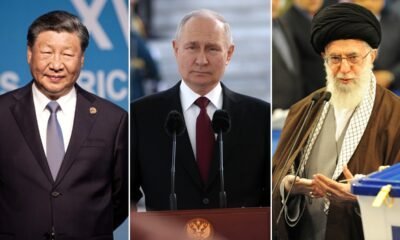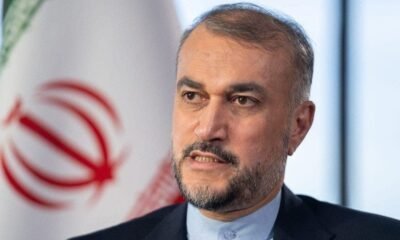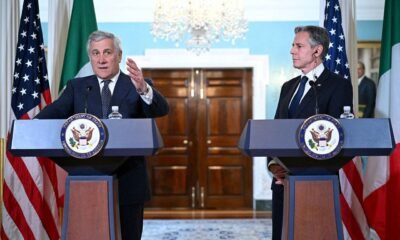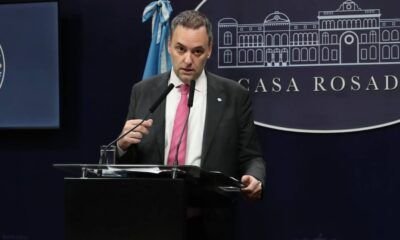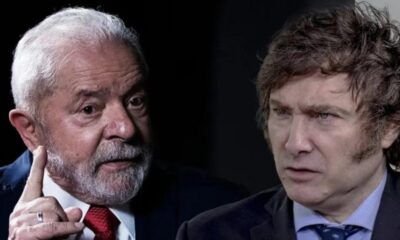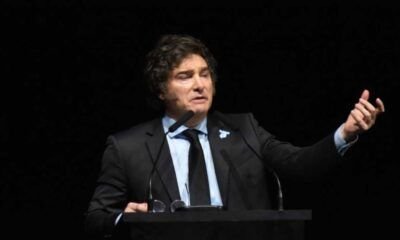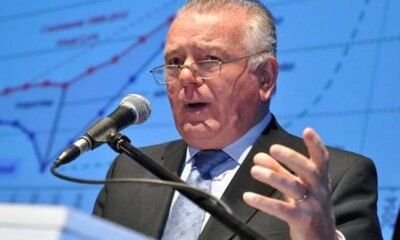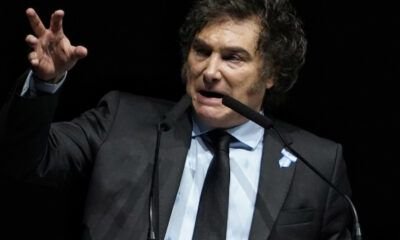INTERNACIONAL
Finland presidential candidates compete to shape country’s foreign and security policies involving Russia
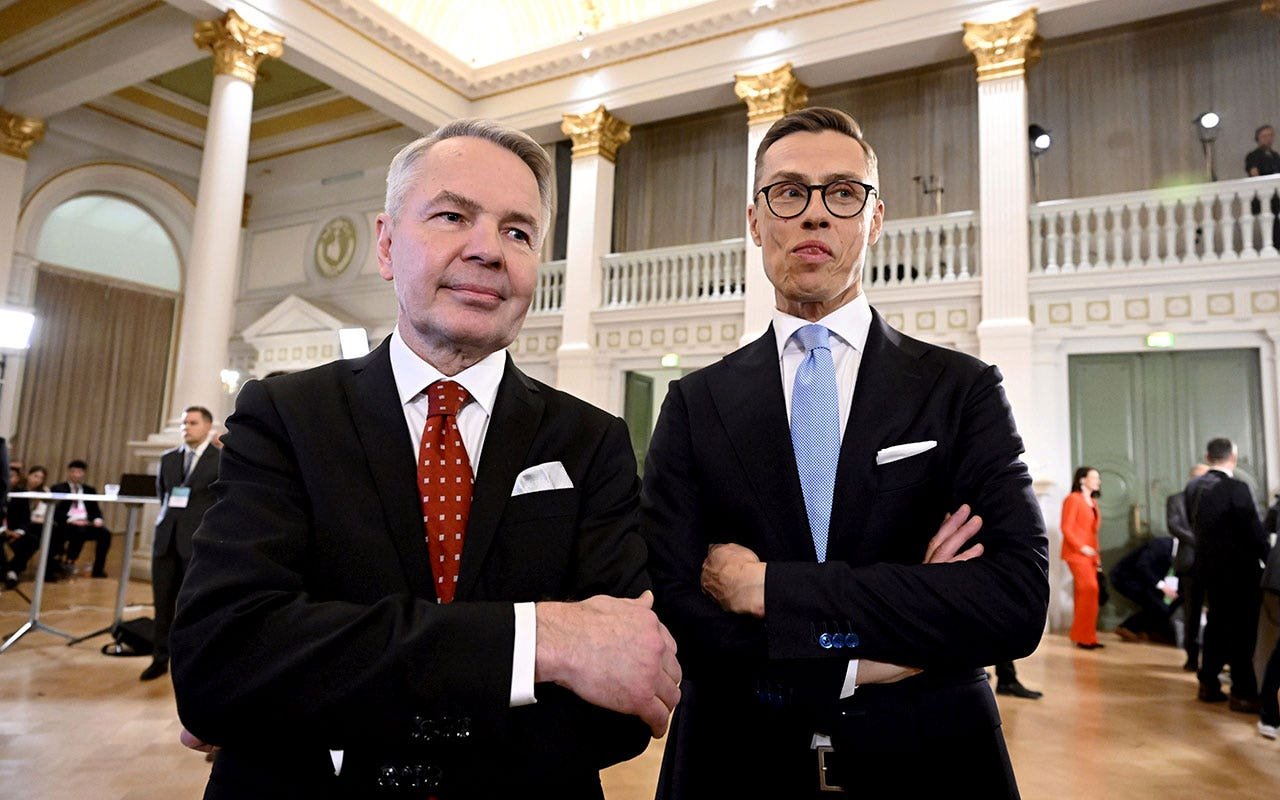
- On Sunday, Finns will choose between two experienced politicians, Alexander Stubb and Pekka Haavisto, to lead the country’s foreign and security policy.
- Stubb and Haavisto largely agree on Finland’s foreign priorities, such as maintaining a tough stance toward Russia and enhancing ties with the U.S.
- Stubb is more open to allowing NATO’s nuclear weapons in Finland, reflecting his pro-NATO stance, while Haavisto is more cautious.
Finns on Sunday will choose either of two experienced politicians to be their next head of state, whose main task will be to steer the Nordic country’s foreign and security policy now that it is a member of NATO, following Russia’s invasion of Ukraine.
Ex-Prime Minister Alexander Stubb, 55, on the center right, and former foreign Minister Pekka Haavisto, 65, from the green left, largely agree on Finland’s foreign policy and security priorities. These include maintaining a hard line toward Moscow and Russia’s current leadership, strengthening security ties with Washington, and the need to help Ukraine both militarily and at a civilian level.
In the last days of campaigning, however, tiny differences in style and approach between the candidates have emerged.
FINLAND EXTENDS CLOSURE OF RUSSIAN BORDER, SAYING MOSCOW HASN’T STOPPED SENDING MIGRANTS
«After the exceptionally polite campaigning of the first round, there has been a bit more confrontation» between the two men vying for the post, said Teivo Teivainen, professor of world politics at the University of Helsinki.
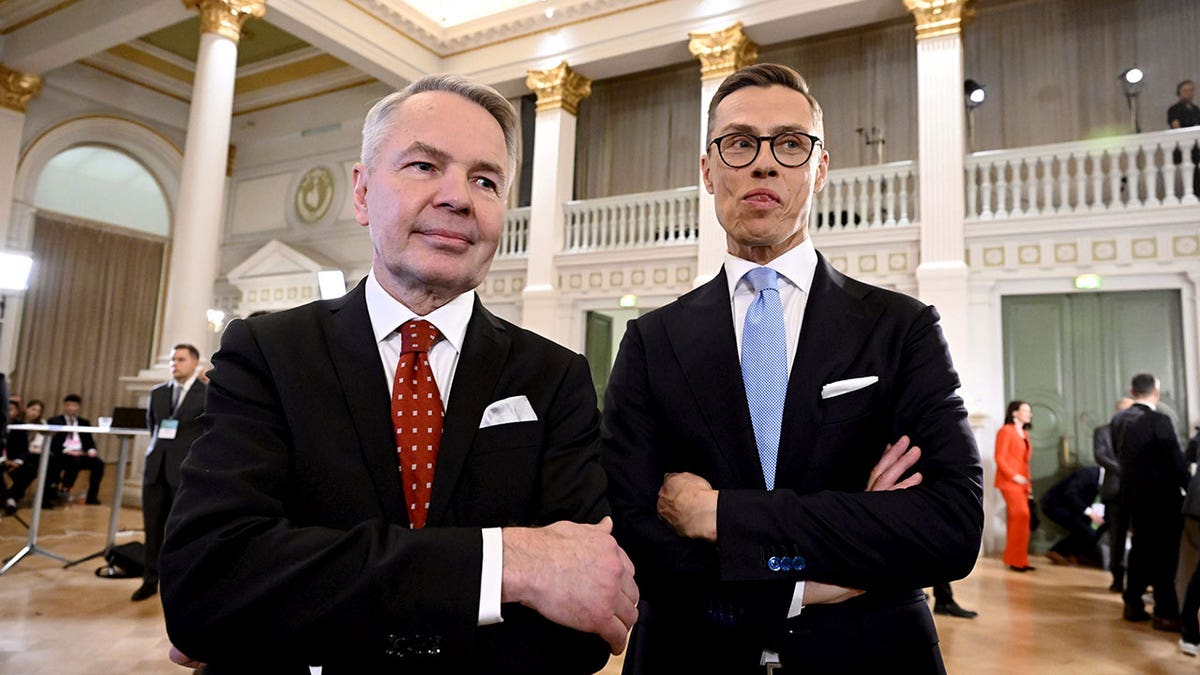
National Coalition Party candidate Alexander Stubb, right, and Social Movement candidate Pekka Haavisto stand during a presidential election event at the Helsinki City Hall, in Helsinki, Finland, on Jan. 28, 2024. Finns on Sunday will choose either of two experienced politicians to be their next head of state, whose main task will be to steer the new NATO member’s foreign and security policy. (Markku Ulander/Lehtikuva via AP, File)
Stubb and Haavisto differ in their stance on the hypothetical question of whether Finland, a NATO newcomer, would allow the transportation of the alliance’s nuclear weapons through its territory.
«Stubb has a more positive attitude in bringing in nuclear weapons into Finland’s territory,» Teivainen said. «This reflects his slightly more positive line towards NATO integration and the United States.»
Unlike in most European countries, the president of Finland holds executive power in formulating foreign and security policy together with the government, especially concerning countries outside the European Union such as the United States, Russia and China.
The head of state also commands the military, particularly important in Europe’s current security environment and the changed geopolitical situation of Finland, which joined NATO in April 2023 in the aftermath of Russia’s attack on Ukraine a year earlier.
A brief look at a map shows why foreign and security policy are so important in this northern European country of 5.6 million people: Finland shares a 1,340-kilometer (832-mile) border with Russia. In November, Helsinki closed all eight official border crossings with its eastern neighbor, alleging that Moscow was using migrants to destabilize Finland in an alleged act of «hybrid warfare.»
A politician with the conservative National Coalition Party, Stubb took the top spot in the first round of the election on Jan. 28 with 27.2% percent of the votes, ahead of the eight other candidates — five men and three women.
Stubb, who led the government in 2014-2015 and earlier held several other Cabinet posts, is the favorite to win the presidency and succeed highly popular President Sauli Niinistö, whose second six-year term expires in March. He is not eligible for reelection.
Haavisto, the runner-up in the first round, was Finland’s top diplomat in 2019-2023 and the main negotiator of its entry into NATO. A former conflict mediator with the United Nations and a devout environmentalist, Haavisto took 25.8% of the votes in the first round.
A runoff was required because none of the candidates got more than half of the votes on Jan. 28. Recent polls indicate Stubb is the front-runner: he is predicted to get 53% to 54% of the votes and Haavisto 46% to 47%.
Haavisto, a former leader of the Green League who is running as an independent, is seeking the post for a third consecutive time after the 2012 and 2018 elections.
The head of state is expected to remain above the fray of day-to-day politics and largely to stay out of domestic political disputes.
However, Finland was hit by massive labor union strikes earlier this month, and the two candidates have faced questions on the campaign trail.
Stubb distanced himself from his party’s approach of giving employers and employees more freedom to settle disputes locally and said he wouldn’t interfere with labor market issues as a president. For his part, Haavisto said he would try — at the very minimum — to bring the parties together for talks behind the scenes.
FINLAND TO CLOSE ENTIRE BORDER WITH RUSSIA OVER CONCERNS OF ‘ORGANIZED’ MIGRANT CROSSINGS
The swing voters will be the supporters of the far-right populist The Finns party and the rural-based Center Party. The candidates for those parties were eliminated in the first round, but some 615,000 people, or nearly 20% of voters, cast their vote for the speaker of Parliament, Jussi Halla-aho, the former leader of The Finns.
Those voters favoring traditional values will now decide the Finnish presidency, analysts say.
«The second round of the election will primarily be decided by the voters of The Finns and the Center Party,» Teivainen said. «There’s a lot of conservatism and patriotism among them, so Haavisto’s homosexuality and civil service background have significance.»
Conscription military service or civil service is mandatory for Finnish males.
Haavisto’s strong advocacy for green policies is seen alienating or splitting some voters, while Stubb’s center-right backers seem much more united in their support.
INTERNACIONAL
La policía de Brasil acusa al ex presidente Jair Bolsonaro de lavado de dinero y asociación delictiva

La policía federal de Brasil ha encausado al expresidente Jair Bolsonaro por lavado de dinero y asociación delictuosa en relación con los diamantes no declarados que recibió de Arabia Saudita durante su mandato, según una fuente con conocimiento de las acusaciones.
Una segunda fuente confirmó la acusación, aunque no por qué delitos concretos. Ambos funcionarios hablaron bajo condición de anonimato porque no estaban autorizados a declarar públicamente.
El Supremo Tribunal Federal de Brasil aún no ha recibido el informe policial con la acusación. Una vez que lo tenga, el procurador general del país, Paulo Gonet, analizará el documento y decidirá si formula cargos y lleva a Bolsonaro a juicio.
Bolsonaro y sus abogados han negado que haya cometido delito alguno en relación con el caso, así como la gran cantidad de investigaciones que enfrenta. Entre ellas se incluye una supuesta orden que el expresidente dio a un ayudante para que manipulara los registros de salud pública con el fin de falsificar su certificado de vacunación de COVID-19 —algo por lo que ya fue acusado—, así como su participación en la incitación a un levantamiento en la capital, Brasilia, el 8 de enero de 2023, que buscaba destituir a su sucesor.
El año pasado, la policía federal acusó a Bolsonaro de intentar meter a escondidas joyería con diamantes supuestamente valorada en 3 millones de dólares y de vender dos relojes de lujo.
La policía dijo en agosto que Bolsonaro recibió casi 70.000 dólares en efectivo por la venta de dos relojes de lujo que recibió como regalos por parte de Arabia Saudí. Brasil exige a sus ciudadanos que llegan en avión desde el extranjero que declaren los bienes por valor de más de 1.000 dólares y que, por cualquier cantidad superior a esa exención, paguen un impuesto equivalente al 50% de su valor.
Las joyas habrían estado exentas del impuesto si hubieran sido un regalo de Arabia Saudita a Brasil, pero no eran para que Bolsonaro se las quedara. Más bien, se habrían añadido a la colección presidencial.
La investigación mostró que uno de los principales colaboradores de Bolsonaro, Mauro Cid, vendió en junio de 2022 un reloj de la marca Rolex y otro de la marca Patek Philippe a una tienda de Estados Unidos por un total de 68.000 dólares. Ambos relojes fueron regalos por parte del gobierno de Arabia Saudí en 2019. Cid firmó un acuerdo de culpabilidad con las autoridades y confirmó todo ello.
Bolsonaro goza de una lealtad incondicional entre su base política, como lo demuestra una avalancha de apoyo en febrero, cuando se estima que 185.000 personas obstruyeron la principal avenida de Sao Paulo para protestar por lo que el expresidente señaló que era una persecución política.
Sus detractores, sobre todo los miembros del Partido de los Trabajadores al que pertenece su rival, el presidente Luiz Inácio Lula da Silva, han celebrado cada avance de las investigaciones y han pedido su arresto en varias ocasiones.
El año pasado, el máximo tribunal electoral de Brasil falló que Bolsonaro abusó de sus poderes presidenciales durante su campaña de reelección de 2022, lo cual lo inhabilita para postularse a cualquier cargo hasta 2030. El caso se centró en una reunión en la que Bolsonaro utilizó a miembros del personal del gobierno, la televisora estatal y el palacio presidencial de Brasilia para decir a embajadores extranjeros que el sistema de voto electrónico del país estaba amañado.
Bolsonaro tiene previsto reunirse con el presidente de Argentina, Javier Milei, este fin de semana en una conferencia conservadora que se celebrará en Balneário Camboriú, en el sur de Brasil.
-
POLITICA2 días ago
La reacción del Gobierno ante la suba del dólar blue: “No vamos a devaluar ni a corrernos del plan de Caputo”
-
POLITICA2 días ago
Tras la tensión diplomática, Lula quiere eliminar el acuerdo automotriz con Argentina
-
POLITICA3 días ago
Milei respondió el comunicado de Bolivia, insistió en que fue “un golpe montando” y criticó a Lula Da Silva
-
ECONOMIA3 días ago
Por la caída de la actividad económica, el superávit de Milei y Caputo está en riesgo
-
ECONOMIA2 días ago
Para el economista Orlando Ferreres, Luis Caputo anunció «un Plan Bonex con otro nombre»
-
POLITICA2 días ago
Gesto de Milei a Mauricio Macri: el Gobierno resigna su representante en la AGN y se lo cede al PRO



